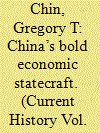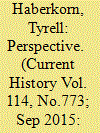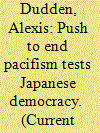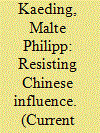|
|
|
Sort Order |
|
|
|
Items / Page
|
|
|
|
|
|
|
| Srl | Item |
| 1 |
ID:
140640


|
|
|
|
|
| Summary/Abstract |
China’s global profile is changing dramatically. An active member of the United Nations and the Bretton Woods organizations (the International Monetary Fund and the World Bank) since the mid-1970s, Beijing is now building new multilateral financial institutions where it sits at the center of the table, making rules and setting standards. After the two decades from the 1980s to the early 2000s, when it aspired mainly to integrate into the existing international economic institutions, China has transformed into an increasingly confident global actor, keen to capitalize on its accumulated resources and experience, and looking to assert itself more prominently in the world economy.
|
|
|
|
|
|
|
|
|
|
|
|
|
|
|
|
| 2 |
ID:
140642


|
|
|
|
|
| Summary/Abstract |
Earlier this year on the sunny morning of April 30, several thousand members of the Communist Party of Vietnam, retired and current military personnel, and select foreign guests assembled in the center of Saigon (officially known as Ho Chi Minh City) to commemorate the 40th anniversary of Vietnam’s political unification. In the run-up to the event, party organizers had pulled out all the stops. An extended holiday was announced. Television and print media bombarded their audiences with interpretations of the anniversary’s meaning. Neighborhood loudspeakers across the country blared patriotic tunes and instructed households to display the nation’s flag. Propaganda brigades replaced billboard advertisements for soap powder and motorbikes with words and images honoring the “total victory” and the “complete liberation” of the south of Vietnam.
|
|
|
|
|
|
|
|
|
|
|
|
|
|
|
|
| 3 |
ID:
140637


|
|
|
|
|
| Summary/Abstract |
On July 17, 2015, People’s Daily announced that a new deputy director of the Chinese Communist Party’s Central Propaganda Department (the official translation has been changed to Department of Publicity in recent years) had appeared at a conference on children’s literature in Beijing. This was the first official notice that Tuo Zhen, the former director of propaganda in Guangdong province, had been promoted to a powerful position in the central government. Tuo had become famous in 2013 thanks to his personal intervention to cut and rewrite key passages of the newspaper Southern Weekend’s New Year’s editorial, hours before it went to press.
|
|
|
|
|
|
|
|
|
|
|
|
|
|
|
|
| 4 |
ID:
140644


|
|
|
|
|
| Summary/Abstract |
Under cover of ambiguous pledges of reform, General Prayuth Chan-ocha and his junta, the National Council for Peace and Order (NCPO), have created the most repressive regime in Thailand since a period of military rule inaugurated by an October 1976 massacre and coup. Prayuth’s seizure of power, launched on May 22, 2014, was the twelfth successful coup since the end of the absolute monarchy in 1932. The 2007 constitution (the country’s eighteenth) was abrogated overnight, martial law put in place, and the jurisdiction of the military courts extended to civilians for crimes against the crown and state. Now, more than a year after the coup, martial law has been revoked but there is no clear sign of either a new constitution or an election.
|
|
|
|
|
|
|
|
|
|
|
|
|
|
|
|
| 5 |
ID:
140641


|
|
|
|
|
| Summary/Abstract |
Japan’s ruling coalition, headed by Prime Minister Shinzo Abe, forced a set of 11 controversial new security bills through the lower house of the National Diet (parliament) in July 2015. Upper house deliberation had just begun as of this writing and was following a similar playbook. Abe and his supporters want the bills enacted by the close of the parliamentary session at the end of September. The voting procedure makes passage likely even if all the opposition parties band together. Public opinion, however, is overwhelmingly opposed to the substance of the bills, which would effectively end the postwar constitution’s ban on Japanese military forces engaging in war abroad. What unfolds in the coming months will clarify the strength and nature of democratic society in Japan today
|
|
|
|
|
|
|
|
|
|
|
|
|
|
|
|
| 6 |
ID:
140639


|
|
|
|
|
| Summary/Abstract |
Last year will be remembered as a year of protests in the Chinese-speaking world. They ranged from frequently occurring smaller incidents in the People’s Republic of China (PRC) and rare protests in Singapore and Macao to large-scale movements in Taiwan and Hong Kong. Early in 2014, the world was surprised by the occupation of Taiwan’s national legislature by the March 18 Movement, later dubbed the Sunflower Movement. In the fall, the Umbrella Movement in Hong Kong made history and captured international attention by occupying sections of the city for weeks. Both were actions against the growing influence of Beijing.
|
|
|
|
|
|
|
|
|
|
|
|
|
|
|
|
| 7 |
ID:
140643


|
|
|
|
|
| Summary/Abstract |
The March 2015 death of an iconic leader, former Prime Minister Lee Kuan Yew (LKY), marks a turning point in Singapore’s history. Known for putting the city-state on the international stage by promoting economic growth while emphasizing stability over democracy, LKY personified the country and defined its political foundation. Even as he lay dying, scholars were speculating as to whether the country could survive without him. This momentous event occurred in a year with another important milestone: Singapore celebrated its fiftieth anniversary as a nation in August. Since it was expelled from Malaysia in 1965, Singapore has flourished, and won wide acclaim for its successes, especially when compared with its neighbors in the region.
|
|
|
|
|
|
|
|
|
|
|
|
|
|
|
|
|
|
|
|
|